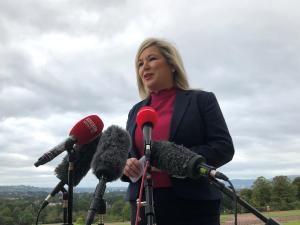
By Q Radio News and PA Reporter
Stormont’s Deputy First Minister has said a potential extension of Northern Ireland’s four-week circuit-break lockdown cannot be taken off the table.
Michelle O’Neill, in her first press conference since emerging from 14 days’ self-isolation, said she hoped the current measures could be lifted on November 13.
But she stressed that an extension may need to be considered if the virus has not been sufficiently suppressed.
“I am very open and honest about the fact that we’re in a very challenging situation,” she said.
“And I believe that everything has to remain on the table, I don’t want us to have to impose further restrictions, I hope we can avoid that.
“I think if everybody works really hard at the measures we’ve brought into place now in this intervention, then we possibly can avoid that. I want us to be able to avoid that. But I’m honest enough to be able to say that all these things have to remain on the table.”
Also at that press conference, Michelle O’Neill said the infection figures seemed to be “moving in the right direction” but stressed it was too early to make a “definitive assessment” on the effectiveness of current restrictions.
“But all the measures which we considered are still going to be on the table at the end of this period, I hope we don’t have to deploy them,” Stormont’s Deputy First Minister added.
The Sinn Fein vice president said the Executive needed to avoid a cycle of lockdowns.
“We need to use this window of opportunity that we have in the next weeks ahead to try to address what is our next step to develop the exit strategy to try and find a way for us to be able to keep the virus at a suppressed level and at the same time open things up as much as we possibly can,” she said.
Deputy First Minister Michelle O’Neill also said investment in the test and trace system was key.
“I think we should try to avoid a cycle of lockdowns,” she said.
“We need a strategy that moves us away from a blanket approach to lockdown or circuit-breaker. I believe the best and most effective way to do that is actually to invest in a first class test, trace and isolate system.
“I think that what we have at the moment doesn’t go far enough and I think there’s certainly a lot of room for improvement.”
Michelle O’Neill insisted the Executive’s key priority was to reopen the schools on November 2.
She indicated the Executive may find itself having to close down other sections of society or the economy in order to keep schools open.
“I think it has to be a policy objective of the whole Executive to have children in school,” Ms O’Neill said.
“So that means that we have to make hard choices around what are the things we have to do in order to keep schools open. But that’ll be a decision for the Executive over the course of the next number of weeks.”
It is great to be out of self-isolation after two weeks
— Michelle O’Neill (@moneillsf) October 23, 2020
Isolation is difficult for individuals and families, but we all must play our part in this battle against COVID
I want to send my support and solidarity to those who are self-isolating
Let’s overcome this virus together! pic.twitter.com/iEe26bt8As
The Deputy First Minister also rejected the suggestion that Northern Ireland’s current restrictions were “light touch” in comparison to the lockdown introduced in the Irish Republic.
“I think actually, what we brought in is actually quite stringent and it is going to impact massively on people’s lives,” she said.
Michelle O’Neill was asked about a DUP suggestion that the Army could be called in to help bolster health service logistics.
She said the issue had been raised throughout the pandemic and claimed some had been playing politics with it.
The Deputy First Minister added: “Obviously there’s a lot of sensitivity around the British Army and their role here. But clearly we’re in the middle of a pandemic and I’ve always said we’ll do whatever is necessary to support people.”
Ms O’Neill said she had also urged health minister Robin Swann to relax restrictions around birthing partners accompanying expectant mothers for key hospital visits.
“We certainly have called on the health minister to be compassionate on this issue and to allow a lot more opportunity for people to be able to have their partner with them for their appointments and their scans and just to be there going through the birth,” she said.
“So we’ve made representations to the health minister and we hope that he’s able to do something on that.”


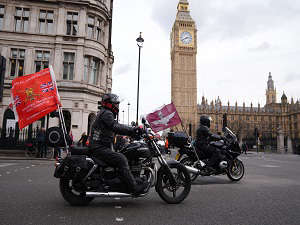 Bikers to descend on Westminster for veterans protest against Legacy Act repeal
Bikers to descend on Westminster for veterans protest against Legacy Act repeal
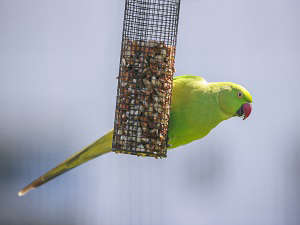 Guidance sought over future of colourful parakeets in Belfast park
Guidance sought over future of colourful parakeets in Belfast park
 Woman released after questioning over pipe bombs in Co Down
Woman released after questioning over pipe bombs in Co Down
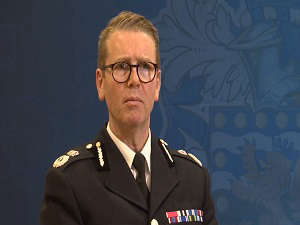 Suspended chief constable will not be prosecuted over alleged sexual offences
Suspended chief constable will not be prosecuted over alleged sexual offences
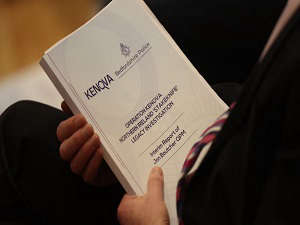 MI5 files not deliberately withheld from Stakeknife probe, review concludes
MI5 files not deliberately withheld from Stakeknife probe, review concludes